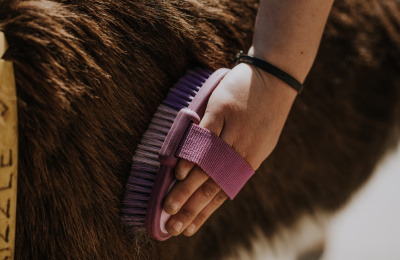Guinness was a very nervous donkey when he arrived into our care. From day one, it was clear he was going to need a lot of time and attention before putting his trust back into people again.
When approached with a head collar, Guinness would always run off and put his head to the floor to avoid being caught, but when it was eventually fitted, he would panic and try and take off with his grooms in hand.
It was so sad to see him react this way and see how stressed and fearful he was. This also made routine treatments very difficult as Guinness was already worried before anything even began.
Here's what Rosie, one of his grooms, had to say:
“One day I walked into the group with some grooming brushes and began brushing some of the more confident donkeys, but this time I wasn’t holding a head collar. I could see Guinness keeping an eye on what was going on from the corner of the barn, and, to my surprise, he started to get closer. Before I knew it, he was stood next to me enjoying a brush. I was shocked as I had never seen him this relaxed around me before."
Rosie realised that one of the main triggers for his nervous behaviour was the head collar and she needed to get him to associate it with something positive, so she started a training plan. She began training in very small stages. First she just let Guinness get used to her being near him, then slowly expanded his comfort zones by stroking him, so he felt comfortable.
It was the same with the head collar. By introducing it one step at a time, Rosie was able to overcome his nervousness, making sure he was rewarded each time with plenty of scratches.



After several months of training, Guinness was a different donkey, and although he is still being trained in other areas, he is no longer nervous and enjoys being groomed.
Guinness is now one of the first donkeys to approach Rosie when she goes into the barn, with or without a head collar. Routine treatments are far less stressful and head collars are no longer the enemy because they often mean scratches and brushes.


